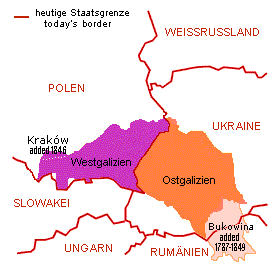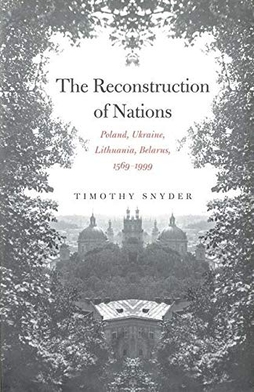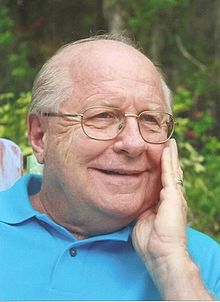Publication history
As a graduate student,Lukas was a contributor to the project that resulted in the publication of Air Force Combat Units of World War II (1961). [7]
The Forgotten Holocaust
The Forgotten Holocaust: The Poles Under German Occupation, 1939-1944 (1986) is Lukas' most famous work and has been re-published in two subsequent editions (1997 and 2012, with a foreword by historian Norman Davies). [15] [16] [17] It focuses on the sufferings of ethnic Poles in German- and Soviet-occupied Poland from 1939 to 1945. [18]
Reviewers had differing views of the book. [19] [20] [21] [18] [22] [23] [15] [24] [25] Donald E. Pienkos published a review in the Slavic Review (1986) that he later described as "generally praising the book"; [26] it was followed by a critical review by David Engel in the same venue describing Lukas' book as a one-sided rebuke of "Jewish historians" and detailing "distortion, misrepresentation, and inaccuracy" in the book. [19] An extensive correspondence followed among Lukas, Engel, and others in Slavic Review. [26] Michael R. Marrus wrote in The Washington Post that "Lukas tells this story with an outrage properly contained within the framework of a scholarly narrative" but criticized what he felt was an unjustified "sustained polemic against Jewish historians". [20] George Sanford noted in International Affairs that in tackling the subject of the suffering of ethnic Poles, Lukas's work is "strictly objective and academic in tone, presentation and content. But the underlying purpose is inevitably a polemical one, as he has to rake over the smouldering ashes of numerous sensitive controversies." [21]
Did the Children Cry?
Karl A. Schleunes in his review of Lukas's book Did the Children Cry?: Hitler's War Against Jewish and Polish Children, 1939–45 (1994) for The American Historical Review noted that it deals with an under-researched topic, and is a valuable contribution to studies of Germanization and the Holocaust. Schleunes writes that "Lukas makes it a point... to stress 'the commonality of suffering of Jewish and Polish children', an effort in which he largely succeeds." [30] Barbara Tepa Lupack, in The Polish Review , wrote that "Lukas in the current volume provides a gripping portrait of the Nazis' systematic genocide plan for all of Poland as well as an excellent analysis of the relationship between Poland's Jewish and gentile communities". [31]
The book received the Janusz Korczak Literary Award from the Anti-Defamation League (ADL). The biennial prize, awarded to books about children, was recommended by a panel of judges. The decision of the ADL’s own literary committee had been overrulled by the political leadership of the organization under Abraham Foxman, which decided to withdraw the prize ten days before the award ceremony but reinstated it when Lukas threatened to sue them. The ADL cancelled the award ceremony and mailed the $1000 US prize money to Lukas. According to the ADL, the book was "problematic in several ways" and "strongly understated the level of anti-Semitism in Poland. It also strongly overstated the number of people who rescued Jews." [17] [32] [33] ADL decision to withdraw the prize has been criticized by Danuta Mostwin [ pl ], member of the panel and founder of the award, Joseph Kutrzeba, Holocaust survivor and film director, Theresa K. Bunk of the Polish American Congress, William A. Donohue, president of the Catholic League for Religious and Civil Rights, John Pawlikowski of the Catholic Theological Union, and historian Victor S. Mamatey. [17] [34] The event has been discussed in the context of anti-Polonism. [35]
Forgotten Survivors
Lukas' continuing interest in the Polish tragedy during World War II culminated in his final volume, the Forgotten Survivors: Polish Christians Remember the Nazi Occupation (2004). [36] Isabel Wollaston in her review of the book for The Slavonic and East European Review noted that "if approached as a memorial volume and/or a collection of oral histories, this is a fascinating book", but due to methodological issues and containing mostly primary accounts, "it should be handled with care and needs to be supplemented and contextualized from other sources if it is to be used for scholarly purposes". [37]

National Armed Forces was a Polish right-wing underground military organization of the National Democracy operating from 1942. During World War II, NSZ troops fought against Nazi Germany and communist partisans. There were also cases of fights with the Home Army.

Rudolf Beran was a Czechoslovak politician who served as prime minister of the country before its occupation by Nazi Germany and shortly thereafter, before it was declared a protectorate. A leader of the Agrarian Party from 1933, he was appointed prime minister by President Emil Hácha on 1 December 1938.
Marek Jan Chodakiewicz is a Polish-American historian specializing in Central European history of the 19th and 20th centuries. He teaches at the Patrick Henry College and at the Institute of World Politics. He has been described as conservative and nationalistic, and his attitude towards minorities has been widely criticized.

Eastern Galicia is a geographical region in Western Ukraine, having also essential historic importance in Poland.

"Restatement of Policy on Germany", or the "Speech of Hope", is a speech given by James F. Byrnes, the US Secretary of State, in Stuttgart on September 6, 1946.

Szmalcownik ; in English, also sometimes spelled shmaltsovnik) is a pejorative Polish slang expression that originated during the Holocaust in Poland in World War II and refers to a person who blackmailed Jews who were in hiding, or who blackmailed Poles who aided Jews, during the German occupation. By stripping Jews of their financial resources, blackmailers added substantially to the danger that Jews and their rescuers faced and increased their chances of being caught and killed.
Tadeusz Piotrowski or Thaddeus Piotrowski is a Polish-American sociologist and author. He is a professor of sociology in the Social Science Division of the University of New Hampshire at Manchester in Manchester, New Hampshire.

Neighbors: The Destruction of the Jewish Community in Jedwabne, Poland is a book published in 2000 written by Princeton University historian Jan T. Gross exploring the July 1941 Jedwabne massacre committed against Polish Jews by their non-Jewish neighbors in the village of Jedwabne in Nazi-occupied Poland.

The Reconstruction of Nations: Poland, Ukraine, Lithuania, Belarus, 1569–1999 is a 2003 book by Timothy Snyder and published by the Yale University Press. It focuses on the last few hundred years of history of several Central and Eastern European countries; in particular, states descended from the Polish–Lithuanian Commonwealth, once the largest state of early modern Europe: Poland, Ukraine, Lithuania and Belarus. The book is concerned with the emergence of those modern states through the troubled history of that region, which included wars and ethnic cleansing, and concludes that national reconciliation and good neighbourly relations are possible even after such difficult events.

The Polish Underground and the Jews, 1939–1945 is a book by American historian Joshua D. Zimmerman, published in 2015 by Cambridge University Press, discussing relations between Poland's Jewish population and the Polish resistance in World War II. Zimmerman argues that polarized narratives, one picturing the Polish underground as anti-Semitic and murderous toward Jews and the other hand as heroically rescuing them, are oversimplified; in fact, different segments and members of the Home Army behaved in diverse ways. The book has received mostly-positive reviews for its evenhanded treatment of a contentious subject matter.

The Forgotten Holocaust: The Poles Under German Occupation, 1939–1944 is a 1986 book by Richard C. Lukas on the killing of, and other crimes against, Jewish and non-Jewish Poles by the Germans during the 1939–1945 occupation of Poland by Nazi Germany and the Soviet Union. It has been described as Lukas' most famous book.

The Generation: The Rise and Fall of the Jewish Communists of Poland is a 1991 book about the intersection of communism in Poland and Polish Jewry. Its primary focus are the Polish Jews of the generation born in the early 1900s, many of whom embraced the communist ideology.
Bitter Legacy: Polish-American Relations in the Wake of World War II is a 1982 book by Richard C. Lukas, published by the University Press of Kentucky. It deals with the postwar Polish history and Polish-American relations, as well as the American aid that was extended to Poland after World War II.
Eagles East: The Army Air Forces and the Soviet Union, 1941–1945 is a 1970 book by Richard C. Lukas. Published by Florida State University Press, it is a military-diplomatic study focusing on the World War II relations between the United States Army Air Forces and the USSR.
The Strange Allies: Poland and the United States, 1941-1945 is a 1978 book by Richard C. Lukas, published by University of Tennessee Press. It deals with the relationship between the United States and the Polish government-in-exile during World War II and highlighted the impact of American Polonia in United States-Polish relations.
Rachel Feldhay Brenner was a Polish-born college professor, writer, and scholar of Jewish literature. She was president of the Association for Israel Studies from 2007 to 2009.
This is a select bibliography of English language books and journal articles about the history of Poland. A brief selection of English translations of primary sources is included. Book entries have references to journal articles and reviews about them when helpful. Additional bibliographies can be found in many of the book-length works listed below; see Further Reading for several book and chapter-length bibliographies. The External Links section contains entries for publicly available select bibliographies from universities and national libraries. This bibliography specifically excludes non-history related works and self-published books.
This is a select bibliography of English language books and journal articles about the history of Poland during World War II. A brief selection of English translations of primary sources is included. Book entries have references to journal articles and reviews about them when helpful. Additional bibliographies can be found in many of the book-length works listed below; see Further Reading for several book and chapter-length bibliographies. The External Links section contains entries for publicly available select bibliographies from universities. This bibliography specifically excludes non-history related works and self-published books.
The Eagle Unbowed: Poland and the Poles in the Second World War is a 2012 book by Halik Kochanski about the Polish contribution to World War II and published by Harvard University Press.
Poland’s Holocaust: Ethnic Strife, Collaboration with Occupying Forces and Genocide in the Second Republic, 1918–1947 is a 1998 book by sociologist Tadeusz Piotrowski. It concerns the topic of Poland's history in the interwar period as well as in World War II, with particular focus on the uneasy relations between various ethnic groups of the Second Polish Republic.










